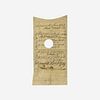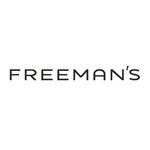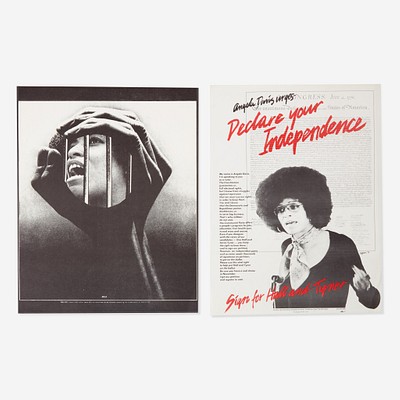[American Revolution] [Tophand, Ezekiel] Partially-Printed State of Connecticut Treasury-Office Certificate
About Seller
2400 Market St
Philadelphia, PA 19147
United States
Established in 1805, Freeman’s Auction House holds tradition close, with a progressive mind-set towards marketing and promotion, along with access to a team of top experts in the auction business. And now with offices in New England, the Southeast, and on the West Coast, it has never been easier to ...Read more
Two ways to bid:
- Leave a max absentee bid and the platform will bid on your behalf up to your maximum bid during the live auction.
- Bid live during the auction and your bids will be submitted real-time to the auctioneer.
Bid Increments
| Price | Bid Increment |
|---|---|
| $0 | $25 |
| $500 | $50 |
| $1,000 | $100 |
| $2,000 | $200 |
| $3,000 | $250 |
| $5,000 | $500 |
| $10,000 | $1,000 |
| $20,000 | $2,000 |
| $30,000 | $2,500 |
| $50,000 | $5,000 |
| $100,000 | $10,000 |
About Auction
Sep 23, 2021
A collection of books and manuscripts. Curated by Darren WInston, Head of the Books and Manuscripts Department at Freeman's. Freeman's info@freemansauction.com
- Lot Description
Scarce State of Connecticut Treasury Certificate issued to a Black Patriot who served in the American Revolution
Connecticut, June 1, 1782. One sheet, approximately 3 1/4 x 7 1/2 in. (82 x 190 mm). Partially-printed State of Connecticut Treasury-Office certificate (Numb. 3963), issued to African-American Revolutionary War soldier, Ezekiel Tophand, for service in the Connecticut Line of the Continental Army, for nine pounds, nine shillings, "Being one fourth Part of the Balance found due to him, which Sum shall be paid to him or his Order at this Office, in Gold or Silver, on or before the first Day of June, A.D. One Thousand Seven Hundred and Eighty Eight...which Interest shall be paid unto him or his Order annually..." Signed by Commissioner of the Loan Office for the state of Connecticut, John Lawrence; MS. on verso recording interest amounts paid unitl 1789. Debt redeemed, and cancelled at center with perforated hole. Anderson CT 19, R2. Lot includes a small print.
Ezekiel Tophand was an African-American soldier from New Haven, Connecticut, who enlisted on December 13, 1776, and fought in David Humphreys (1752-1818) all-black Company in the 4th Connecticut Regiment during the American Revolution. This company consisted of 48 black privates and NCOs and was formed in October of 1780, and served until November 1782 when it was reorganized under the command of Zebulon Butler (1731-95).
"This segregated unit, black soldiers under white officers, was created as the Sixth Connecticut in the Continental Army's reorganization of late 1780. As of January 1, 1781 Connecticut's nine regiments were reduced to five. The Sixth Connecticut was the only regiment not to be combined with another in the consolidation. It simply changed its name, from the Sixth to the Fourth. All black soldiers formerly of the Sixth were placed in an all-black company in the Fourth Connecticut, along with five new black recruits. Other men of color in the Connecticut line remained scattered among white regiments, as was typical in the Continental Army. The Company's captain, David Humphreys, is listed on the muster as an aide-de-camp to 'His Excellency,' referring to George Washington. He had two jobs and so did not devote himself entirely to his unit. Indeed Humphrey's correspondence from this period has him far away from his men's camp at West Point...By 1782, these black privates were seasoned soldiers. Most had enlisted in 1777, when the laws of Connecticut opened service to all males between the ages of sixteen and sixty. In 1777 the Connecticut legislature also freed slave owners from any financial liability connected with slaves they had freed. This law, combined with one that allowed men to hire substitutes for military service, assured that freeing slaves and having them serve in the stead of the master would entail no financial risk if the ex-slave could not support himself in the future. And so...slaves joined the army for the war's duration with the prospect of freedom at the end..." (Judith L. Van Buskirk, Standing in their Own Light: African American Patriots in the American Revolution, 2017, pp. 8-10).
It is estimated that close to 10,000 African-Americans served in the Continential Army and various state militias during the American Revolution, while around 20,000 served in the British Army. Promises of freedom from enslavement was a large motivating factor for joining either the Patriot or British armies. The average length of enlistment for African-American soldiers was around 4 1/2 years, with some serving for the duration of the war. This length is estimated to be almost eight-times that of the average white soldier.
- Shipping Info
-
No lot may be removed from Freeman’s premises until the buyer has paid in full the purchase price therefor including Buyer’s Premium or has satisfied such terms that Freeman’s, in its sole discretion, shall require. Subject to the foregoing, all Property shall be paid for and removed by the buyer at his/ her expense within ten (10) days of sale and, if not so removed, may be sold by Freeman’s, or sent by Freeman’s to a third-party storage facility, at the sole risk and charge of the buyer(s), and Freeman’s may prohibit the buyer from participating, directly or indirectly, as a bidder or buyer in any future sale or sales. In addition to other remedies available to Freeman’s by law, Freeman’s reserves the right to impose a late charge of 1.5% per month of the total purchase price on any balance remaining ten (10) days after the day of sale. If Property is not removed by the buyer within ten (10) days, a handling charge of 2% of the total purchase price per month from the tenth day after the sale until removal by the buyer shall be payable to Freeman’s by the buyer. Freeman’s will not be responsible for any loss, damage, theft, or otherwise responsible for any goods left in Freeman’s possession after ten (10) days. If the foregoing conditions or any applicable provisions of law are not complied with, in addition to other remedies available to Freeman’s and the Consignor (including without limitation the right to hold the buyer(s) liable for the bid price) Freeman’s, at its option, may either cancel the sale, retaining as liquidated damages all payments made by the buyer(s), or resell the property. In such event, the buyer(s) shall remain liable for any deficiency in the original purchase price and will also be responsible for all costs, including warehousing, the expense of the ultimate sale, and Freeman’s commission at its regular rates together with all related and incidental charges, including legal fees. Payment is a precondition to removal. Payment shall be by cash, certified check or similar bank draft, or any other method approved by Freeman’s. Checks will not be deemed to constitute payment until cleared. Any exceptions must be made upon Freeman’s written approval of credit prior to sale. In addition, a defaulting buyer will be deemed to have granted and assigned to Freeman’s, a continuing security interest of first priority in any property or money of, or owing to such buyer in Freeman’ possession, and Freeman’s may retain and apply such property or money as collateral security for the obligations due to Freeman’s. Freeman’s shall have all of the rights accorded a secured party under the Pennsylvania Uniform Commercial Code.
-
- Buyer's Premium



 EUR
EUR CAD
CAD AUD
AUD GBP
GBP MXN
MXN HKD
HKD CNY
CNY MYR
MYR SEK
SEK SGD
SGD CHF
CHF THB
THB![[American Revolution] [Tophand, Ezekiel] Partially-Printed State of Connecticut Treasury-Office Certificate](https://s1.img.bidsquare.com/item/l/9242/9242256.jpeg?t=1MmbG2)
![[American Revolution] [Tophand, Ezekiel] Partially-Printed State of Connecticut Treasury-Office Certificate](https://s1.img.bidsquare.com/item/s/9242/9242256.jpeg?t=1MmbG2)











